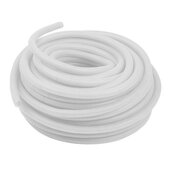kolek
Inventor of the Electron
- Joined
- Sep 29, 2021
- Messages
- 699
I assume it is, but is it a code violation to run plastic conduit (containing PV wire) elevated by, say, fence posts?
Or all conduit must be buried from the PV array back to the house?
Is it allowable to have the PV array wires running exposed at any point, for example, under the roof of buildings on the way to the house?
2nd question.
I assume this is also a code violation, but can you put your conduit though a drainage pipe that runs under a small practically unused pubic road in the countryside in order to get your PV wires across said road? If not, how would you get your PV wires across a road? I can imagine this could potentially be a regulatory nightmare.
I know it depends on jurisdiction but just curious what generally the rules are in your neck of the woods.
Or all conduit must be buried from the PV array back to the house?
Is it allowable to have the PV array wires running exposed at any point, for example, under the roof of buildings on the way to the house?
2nd question.
I assume this is also a code violation, but can you put your conduit though a drainage pipe that runs under a small practically unused pubic road in the countryside in order to get your PV wires across said road? If not, how would you get your PV wires across a road? I can imagine this could potentially be a regulatory nightmare.
I know it depends on jurisdiction but just curious what generally the rules are in your neck of the woods.



